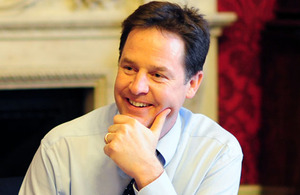Deputy Prime Minister Nick Clegg's Leveson statement in the House of Commons
The Deputy Prime Minister's words during the Leveson debate in the House of Commons.

Speaking during the Leveson debate in the House of Commons, Deputy Prime Minister Nick Clegg said:
Mr Speaker, when Lord Justice Leveson published his recommendations, the Liberal Democrats supported them.
I agreed with his basic model of a new, independent self-regulatory body for the press with a new recognition body authorised to check, periodically, that the system is working properly.
Given the importance of the relationships between politicians, the public and the press.
I said at the outset that we should not become fixated on the means of change but stay focused on the end we all seek:
An independent press watchdog in which people can place their trust.
And my party has been clear from the outset:
The worst outcome in all of this would have been for nothing to happen at all.
A very real possibility at points.
So, throughout this process I have sought to be pragmatic on the details, while making sure that any reforms satisfy three tests.
One: they must deliver the model of independent self-regulation set out by Lord Justice Leveson.
Two: they must command the widest possible cross-party support, which Lord Justice Leveson also said is critical.
Three: they must strike the right balance between protecting and cherishing the great tradition of a free press in this country whilst also protecting innocent people from unwarranted intimidation and bullying by powerful interests in our media.
Don’t forget - the hacking scandal was caused by some of our biggest newspapers, but it was still a minority of newspapers.
Certainly not the local and regional press who mustn’t pay the price for a problem they didn’t create.
A free press is one of the most potent weapons against the abuse of authority in our society, holding the powerful to account.
Equally, however, the media must not abuse their own power at the cost of innocent people.
Mr Speaker, our Royal Charter meets all three tests.
It delivers Leveson.
It commands cross-party support.
It strikes the right balance between the freedom of the press and the rights of individuals.
One of the biggest hurdles we have had to overcome has been the polarisation of this debate.
The idea that you are either for full statute, or fully against statute.
That you are either on the side of the victims, or on the side of the press - when in reality most people are on the side of both.
But we have not succumbed to these false choices.
We have forged a middle way.
A Royal Charter protected by legislation.
A system of independent, self-regulation; a voluntary system, just as Lord Justice Leveson outlined - but with two specific statutory provisions.
First, a legal provision to ensure that - if a newspaper is signed up to the regulatory regime - judges can take that into account when awarding costs and damages in the courts.
Papers will be rewarded for playing by the rules.
That is the strong incentive to sign up to the system that Lord Justice Leveson proposed.
And I very much hope the newspaper groups will now see the logic of this incentive and get behind these reforms.
Second, an entrenchment clause to prevent future governments from chopping and changing the Royal Charter on a whim.
I have been pushing for this legal safeguard consistently, since the Royal Charter model was first proposed.
Without it, the Royal Charter would leave the door open to political meddling by future governments - a risk we must not take.
With these protections, this Royal Charter, represents the best possible outcome.
I would like to pay tribute to the campaigners, the victims, the families - without whom none of this would have happened.
Their ordeals forced us to sit up and take notice.
But it has been their tireless efforts and remarkable determination that has kept the pressure up.
Throughout the - sometimes fraught - political negotiations they have remained steady and consistent, asking simply that we do the right thing.
Finally, I’d like to commend members across this House - and both the Prime Minister and the Leader of the Opposition - for working across party lines to get this done.
The truth is: this is not a victory for any one individual or any one team.
It is a victory for working together.
For putting narrow interests to one side.
For sticking with it.
Today we turn a page on the mistakes of the past…
Today we establish, finally, a proper, independent watchdog to serve the British people while protecting our free press.